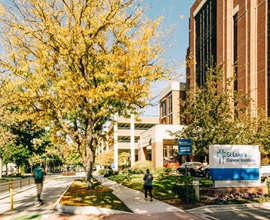St. Luke’s Oncologist Experiences His First Colonoscopy

As a medical oncologist, I have provided care for hundreds of patients with advanced colorectal cancer. It is a harrowing and heartbreaking experience, in some respects even more so than other cancers because we can do something to actually prevent colorectal cancer through screening.
March is Colorectal Cancer Awareness Month. According to the Centers for Disease Control and Prevention, every year about 140,000 people are diagnosed with colorectal cancer, and more than 50,000 people die from it. Screening saves lives, because a person can have pre-cancerous growths (polyps) or colorectal cancer without having any symptoms.
Screening can be done in several ways. The gold standard is a colonoscopy, in which a doctor puts a camera through the full length of the colon and rectum to look for polyps and removes them if they are present.
So who should get screened for colorectal cancer? Anyone over the age of 50, and potentially earlier for people with a family history of colon cancer.
I am one of those people, so at the age of 40 this year, I knew it was time to practice what I preach and sign up for my colonoscopy. I conferred with one of our many excellent gastroenterologists and he agreed it was time for me to sign up for a colonoscopy.

As a doctor who deals with this all the time, I recognize it’s easy to say, “Just go get your colonoscopy,” but it’s another to actually go through it. The fear of finding something on a screening exam is sometimes enough to inhibit you from getting the exam in the first place. But you can’t let it. I figured either I get the reassurance that I’m “clean” or I get a polyp or early-stage cancer found and removed before it causes problems for me and my family. So I was committed to doing my screening.
There also can be a certain squeamishness and snickering attendant to the idea of a camera tube winding its way up your nether regions, no doubt. However, this is nothing in comparison to dying of colorectal cancer.
So, what is it like? Let’s find out together. The day before I went in for my procedure, I had to do the “prep.” This means preparation of the colon for optimal viewing by getting rid of as much stool as possible.
In this case, I received instructions to take two Dulcolax pills (laxatives) early in the day. Tiny little pills, down the hatch, no problem. I was told there could be some abdominal cramping, but I didn’t notice any. At this point, I couldn’t have any solid food, and I learned that the hardest part of this prep is just eating chicken broth for a day.
Then, I mixed a bottle of Miralax powder (a more powerful laxative) into 64 ounces of lemon-lime Gatorade and drank half of it the evening before my procedure. I have to admit it wasn’t that bad. I noticed the Gatorade was a little more viscous than normal and some of the Miralax powder didn’t completely dissolve. I recommend it chilled.
About an hour later, I was on the pot. Repeatedly. Do not leave home. Do not stray far from the bathroom. By nighttime, I was able to get in bed with some degree of intestinal assurance. My wife felt otherwise and slept on our daughter’s trundle bed.

Because my procedure was scheduled for 9:15 a.m. the next day, I had to set my alarm for 3 a.m. and finish off the rest of the spiked Gatorade. Back on the pot. By the time I was done there was no solid material coming out of me. A lot like urinating out the wrong hole. I knew my gastroenterologist would be proud of me.
When it came time for the procedure, I was taken to the pre-procedure area and a nurse placed an IV for the sedative. My blood pressure was a little high, and it dawned on me that perhaps I was more nervous than I thought. After all, most of the past 16 hours was occupied by doing laps back and forth to the toilet, and I hadn’t really thought much about what happens if he finds something on the colonoscopy.
Shortly after arriving in the pre-procedure area, I was rolled back to the procedure room and greeted by the gastroenterologist and the procedure nurse. They told me that a milky concoction of the sedatives propofol and Versed would send me off to a (zzzzzzzz….).
And then I woke up to the doctor’s smiling face and the words “Everything looks great. Didn’t find a thing.” I wanted to ask for a gold star for how well I prepped, but then I drifted off again.
My wife picked me up and brought me home, and after a one-hour nap I felt good as new. No abdominal pain, no cramping. Be aware: They expand the colon with gas to improve visualization of the colon, and that gas does make its way out over the course of the day.
Most importantly, I had the reassurance that I am free of colorectal cancer.
Experiencing a temporary surge in what are otherwise normal bodily functions and having to miss a day of work are a small price to pay for a test that could save your life or the life of someone you love. Please, if you are over 50, or you are younger and have a family history of colon cancer (like me), I urge you to get screened for colorectal cancer.
About The Author

Dr. Dan Zuckerman is the medical director of St. Luke’s Cancer Institute.


